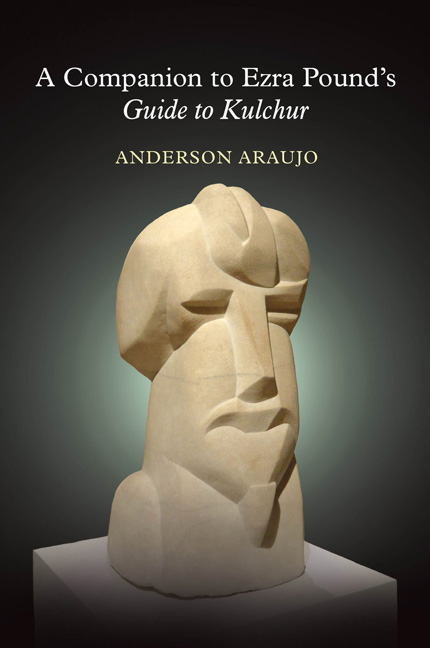Book contents
- Frontmatter
- Contents
- Acknowledgments
- Abbreviations
- Introduction
- Guide to Kulchur
- Part I
- Section I
- Section II
- Part II
- Section III
- Section IV
- Part III
- Section V
- Section VI
- 22 Savoir Faire
- 23 The New Learning: Part Two
- 24 Examples Of Civilization
- 25 Books “About”
- 26 On Answering Critics
- Part IV
- Section VII
- Section VIII
- Section IV
- Part V
- Section X
- Section XI
- Part VI
- Section XII
- Section XIII
- Addenda: 1952
- Notes
- Index
22 - Savoir Faire
from Section VI
- Frontmatter
- Contents
- Acknowledgments
- Abbreviations
- Introduction
- Guide to Kulchur
- Part I
- Section I
- Section II
- Part II
- Section III
- Section IV
- Part III
- Section V
- Section VI
- 22 Savoir Faire
- 23 The New Learning: Part Two
- 24 Examples Of Civilization
- 25 Books “About”
- 26 On Answering Critics
- Part IV
- Section VII
- Section VIII
- Section IV
- Part V
- Section X
- Section XI
- Part VI
- Section XII
- Section XIII
- Addenda: 1952
- Notes
- Index
Summary
SAVOIR FAIRE: (Fr.) “Knowledge of the correct course of action in a particular situation.”
the Odyssey and the Ta Hio: Homer's Odyssey (cf. note GK 24) and Confucius's Ta Hio (The Great Learning) (cf. notes GK 15–16).
the Odes: The Confucian Odes (cf. note GK 121).
The Duce and Kung fu Tseu: Mussolini and Confucius.
Eleusis: Archaeological evidence traces the origins of the Eleusinian Mysteries, paramount among ancient Greek mystery cults, to the Mycenaean period (fifteenth century BCE). The site of Eleusis was likely destroyed by Alaric the Visigoth around 395 BCE. Situated at the crossroads of a trade route linking Attica and the Peloponnese, Eleusis hosted secret rites to worship and honor Demeter, the Greek goddess of grain, and her daughter Kore (“maiden”), or Persephone, as told in the Homeric Hymn to Demeter. The two stages of initiation at Eleusis—myesis and epopteia—entailed a progression for the initiant from being a mystes (one with closed eyes and/ or mouth) to becoming an epoptes (one who sees).2 Pound's “catechumens” (from the Greek, κατηχούμενος or “one being instructed in the rudiments of religion”) may be seen as analogous to initiants. In Origine et esthetique de la tragedie (1905), the French Rosicrucian Josephin Peladan (1858–1918) calls Eleusis a “theatre religieux,” unearthing the roots of Greek drama in the Mysteries. His eccentric historiography runs counter to scholarly consensus on the origins of Greek drama in the Athenian festival of Dionysus, where the first tragedies are said to have been staged in 534 BCE. In 1906, Pound reviewed Peladan's Origine et esthetique de la tragedie and Le secret des troubadours: de Parsifal a Don Quichotte (1906). Pound would eventually merge the ideas in these two books so that by the 1930s he was identifying the Albigensian heresy, troubadour art, and Eleusis. Seminal for Pound, too, as Surette argues, is Peladan's “conception of the mystery cult—although not the details of its belief—and the idea of formulating history in terms of such a secret cult.” Crucially, Peladan also introduced Pound to the palingenetic nekuia, the descent into the underworld (Hades) and calling forth of the dead in the Eleusinian rites.
- Type
- Chapter
- Information
- A Companion to Ezra Pound's Guide to KulcherGuide to Kulcher, pp. 184 - 192Publisher: Liverpool University PressPrint publication year: 2018



